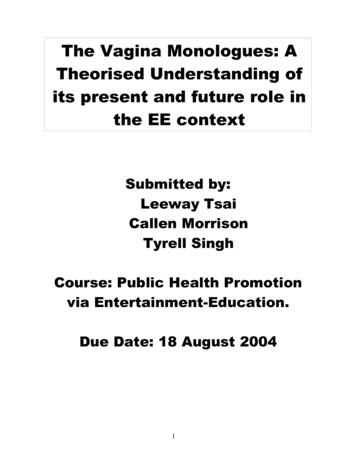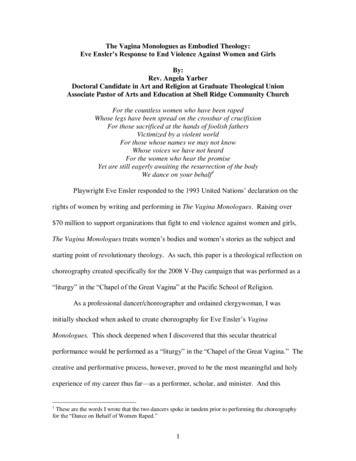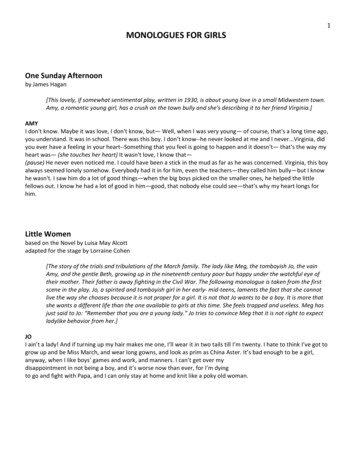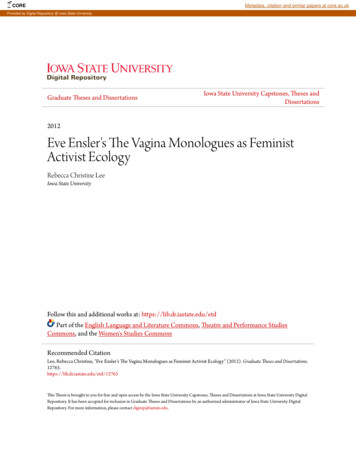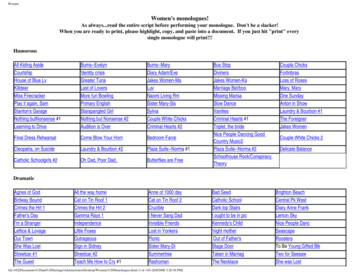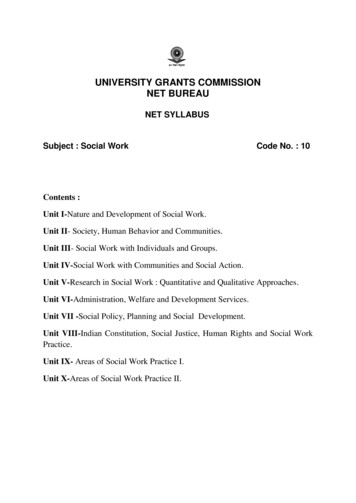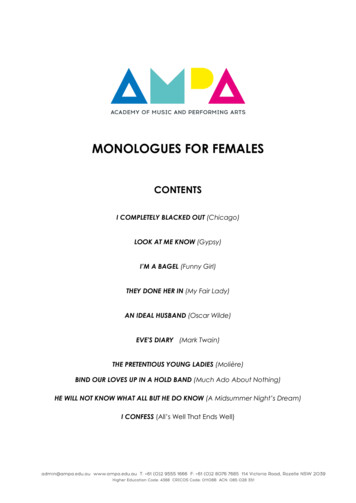
Transcription
MONOLOGUES FOR FEMALESCONTENTSI COMPLETELY BLACKED OUT (Chicago)LOOK AT ME KNOW (Gypsy)I’M A BAGEL (Funny Girl)THEY DONE HER IN (My Fair Lady)AN IDEAL HUSBAND (Oscar Wilde)EVE'S DIARY (Mark Twain)THE PRETENTIOUS YOUNG LADIES (Molière)BIND OUR LOVES UP IN A HOLD BAND (Much Ado About Nothing)HE WILL NOT KNOW WHAT ALL BUT HE DO KNOW (A Midsummer Night’s Dream)I CONFESS (All’s Well That Ends Well)
‘I Completely Blacked Out' from ChicagoCharacter name:Velma KellyGender:FemaleAge Range:23 — 30Show:ChicagoDuration: 0 — 1 minutesMonologue Type:dramatic,contemporaryNotes:NoneMy sister, Veronica, and I had this double act and my husband, Charlie,traveled around with us. Now for the last number in our act, we didthese 20 acrobatic tricks in a row, one, two, three, four, five. Splits,spread eagles, back flips, flip flops, one right after the other. Well, thisone night before the show we are in a hotel Cicero, the three of us,sittin' up in a hotel room, boozin' and havin' a few laughs and we ranout of ice, so I went out to get some. I come back, open the door Andthere's Veronica and Charlie doing Number Seventeen -the spreadeagle. Well, I was in such a state of shock, I completely blacked out. Ican't remember a thing. It wasn't until later, when I was washing theblood off my hands I even knew they were dead.
'Look At Me Now' from GypsyCharacter name:LouiseGender:FemaleAge Range:15 — 23Show:GypsyDuration: 0 — 1 minutesMonologue Type:dramatic,contemporaryNotes:NoneI said turn it off! Nobody laughs at me, because I laugh first. At me. Mefrom Seattle. Me with no education. Me with no talent, as you've keptreminding me my whole life! Well, Mama, look at me now. Look! Lookwhere I live. Look at my friends. Look where I'm going. I'm not staying inburlesque, I'm moving. Maybe up maybe down. But wherever I'mgoing, I'm having the time of my life, because for the first time, it is mylife! And I love it! I love every second of it! I am Gypsy Rose Lee! And Ilove her! And if you don't you can just clear out! Now!
'I'm a Bagel' from Funny GirlCharacter name:Fanny BriceGender:FemaleAge Range:18 — 30Show:Funny GirlDuration: 0 — 1 minutesMonologue Type:comedicNotes:NoneSuppose all ya ever had for breakfast was onion rolls. Then one day, inwalks (gasp) a bagel! You'd say, 'Ugh, what's that?' Until you tried it!That's my problem - I'm a bagel on a plate full of onion rolls. Nobodyrecognizes me! Listen, I got 36 expressions. Sweet as pie and tough asleather. And that's six expressions more than all those.Barrymores puttogether. Instead of just kicking me, why don't they give me a lift? Well,it must be a plot, 'cause they're scared that I got.such a gift! 'CauseI'm the greatest star, I am by far, but no one knows it. Wait - they'regonna hear a voice, a silver flute. They'll cheer each toot, hey, she'sterrific!, when I expose it. Now can't you see to look at me that I'm anatural Camille, and as Camille, I just feel, I've so much to offer. Kid, Iknow I'd be divine because I'm a natural cougher (coughs) - some ain'tgot it, not a lump. I'm a great big clump of talent! Laugh, they'll bend inhalf. Did you ever hear the story about the travelling salesman? Athousand jokes, stick around for the jokes. A thousand faces. I reiterate.When you're gifted, then you're gifted. These are facts, I've got no axeto grind. Ay! What are ya, blind? In all of the world so far, I'm thegreatest star! No autographs, please. What? You think beautiful girls aregonna stay in style forever? I should say not! Any minute now they'regonna be out! FINISHED! Then it'll be my turn!
'They Done Her In' from My Fair LadyCharacter name:Eliza DoolittleGender:FemaleAge Range:17 — 30Show:My Fair LadyDuration: 0 — 1 minutesMonologue Type:comedicNotes:NoneMy aunt died of influenza, so they said. But it's my belief they done theold woman in. Yes Lord love you! Why should she die of influenza whenshe come through diphtheria right enough the year before? Fairly bluewith it she was. They all thought she was dead. But my father, he keptladling gin down her throat. Then she come to so sudden that she bitthe bowl off the spoon. Now, what would you call a woman with thatstrength in her have to die of influenza, and what become of her newstraw hat that should have come to me? Somebody pinched it, andwhat I say is, them that pinched it, done her in. Them she lived withwould have killed her for a hatpin, let alone a hat. And as for fatherladling the gin down her throat, it wouldn't have killed her. Not her. Ginwas as mother's milk to her. Besides, he's poured so much down his ownthroat that he knew the good of it.
AN IDEAL HUSBANDA monologue from the play by Oscar WildeMABEL CHILTERN: Well, Tommy has proposed to me again. Tommy reallydoes nothing but propose to me. He proposed to me last night in themusic-room, when I was quite unprotected, as there was an elaboratetrio going on. I didn't dare to make the smallest repartee, I need hardlytell you. If I had, it would have stopped the music at once. Musicalpeople are so absurdly unreasonable. They always want one toz beperfectly dumb at the very moment when one is longing to beabsolutely deaf. Then he proposed to me in broad daylight thismorning, in front of that dreadful statue of Achilles. Really, the thingsthat go on in front of that work of art are quite appalling. The policeshould interfere. At luncheon I saw by the glare in his eye that he wasgoing to propose again, and I just managed to check him in time byassuring him that I was a bimetallist. Fortunately I don't know whatbimetallism means. And I don't believe anybody else does either. Butthe observation crushed Tommy for ten minutes. He looked quiteshocked. And then Tommy is so annoying in the way he proposes. If heproposed at the top of his voice, I should not mind so much. That mightproduce some effect on the public. But he does it in a horridconfidential way. When Tommy wants to be romantic he talks to onejust like a doctor. I am very fond of Tommy, but his methods ofproposing are quite out of date. I wish, Gertrude, you would speak tohim, and tell him that once a week is quite often enough to propose toany one, and that it should always be done in a manner that attractssome attention.
EVE'S DIARYA monologue from the book by Mark TwainNOTE: This monologue is reprinted from Eve's Diary. Mark Twain. NewYork: Harper & Brothers, 1906.EVE: We are getting along very well now, Adam and I, and gettingbetter and better acquainted. He does not try to avoid me any more,which is a good sign, and shows that he likes to have me with him. Thatpleases me, and I study to be useful to him in every way I can, so as toincrease his regard. During the last day or two I have taken all the workof naming things off his hands, and this has been a great relief to him,for he has no gift in that line, and is evidently very grateful. He can'tthink of a rational name to save him, but I do not let him see that I amaware of his defect. Whenever a new creature comes along I name itbefore he has time to expose himself by an awkward silence. In thisway I have saved him many embarrassments. I have no defect like this.The minute I set eyes on an animal I know what it is. I don't have toreflect a moment; the right name comes out instantly, just as if it werean inspiration, as no doubt it is, for I am sure it wasn't in me half aminute before. I seem to know just by the shape of the creature andthe way it acts what animal it is. When the dodo came along hethought it was a wildcat--I saw it in his eye. But I saved him. And I wascareful not to do it in a way that could hurt his pride. I just spoke up in aquite natural way of pleasing surprise, and not as if I was dreaming ofconveying information, and said, "Well, I do declare, if there isn't thedodo!" I explained--without seeming to be explaining--how I know it fora dodo, and although I thought maybe he was a little piqued that Iknew the creature when he didn't, it was quite evident that he admiredme. That was very agreeable, and I thought of it more than once withgratification before I slept. How little a thing can make us happy whenwe feel that we have earned it!
THE PRETENTIOUS YOUNG LADIESA monologue from the play by MolièreNOTE: This monologue is reprinted from The Dramatic Works of Molière.New York: R. Worthington Publishers, 1880.MADELON: Good heavens! If everybody was like you a love-story wouldsoon be over. Matrimony ought never to happen till after otheradventures. A lover, to be agreeable, must understand how to utterfine sentiments, to breathe soft, tender, and passionate vows; hiscourtship must be according to the rules. In the first place, he shouldbehold the fair one of whom he becomes enamoured either at aplace of worship, or when out walking, or at some public ceremony; orelse he should be introduced to her by a relative or a friend, as if bychance, and when he leaves her he should appear in a pensive andmelancholy mood. For some time he should conceal his passion fromthe object of his love, but pay her several visits, in every one of whichhe ought to introduce some gallant subject to exercise the wits of allthe company. When the day comes to make his declarations--whichgenerally should be contrived in some shady garden-walk while thecompany is at a distance--it should be quickly followed by anger,which is shown by our blushing, and which, for a while, banishes thelover from our presence. He finds afterwards means to pacify us, toaccustom us gradually to hear him depict his passion, and to drawfrom us that confession which causes us so much pain. After that comethe adventures, the rivals who thwart mutual inclination, thepersecutions of fathers, the jealousies arising without any foundation,complaints, despair, running away with, and its consequences. Thusthings are carried on in fashionable life, and veritable gallantry cannotdispense with these forms. But to come out point-blank with a proposalof marriage--to make no love but with a marriage-contract, and begina novel at the wrong end! Once more, father, nothing can be moretradesman like, and the mere thought of it makes me sick at heart.
'Bind our Loves up in a Holy Band' from Much Ado About NothingBEATRICE:[Coming forward] What fire is in mine ears? Can this be true? Stand Icondemned for pride and scorn so much? Contempt, farewell! andmaiden pride, adieu! No glory lives behind the back of such. And,Benedick, love on; I will requite thee, Taming my wild heart to thy lovinghand: If thou dost love, my kindness shall incite thee To bind our lovesup in a holy band; For others say thou dost deserve, and I Believe itbetter than reportingly. Taming my wild heart to thy loving hand: If thoudost love, my kindness shall incite thee To bind our loves up in a holyband; For others say thou dost deserve, and I Believe it better thanreportingly.
'He Will Not Know What All But He Do Know' from A Midsummer Night'sDreamHELENA:How happy some o'er other some can be!Through Athens I am thought as fair as she.But what of that? Demetrius thinks not so;He will not know what all but he do know.And as he errs, doting on Hermia's eyes,So I, admiring of his qualities.Things base and vile, holding no quantity,Love can transpose to form and dignity.Love looks not with the eyes, but with the mind,And therefore is winged Cupid painted blind.Nor hath Love's mind of any judgment taste;Wings, and no eyes, figure unheedy haste.And therefore is Love said to be a child,Because in choice he is so oft beguiled.As waggish boys in game themselves forswear,So the boy Love is perjured everywhere.For ere Demetrius looked on Hermia's eyne,He hailed down oaths that he was only mine;And when this hail some heat from Hermia felt,So he dissolved, and show'rs of oaths did melt.I will go tell him of fair Hermia's flight.Then to the wood will he to-morrow nightPursue her; and for this intelligenceIf I have thanks, it is a dear expense.But herein mean I to enrich my pain,To have his sight thither and back again.
'I Confess' from All's Well That Ends WellHELENA:I confessHere on my knee before high heaven and you,That before you, and next unto high heaven,I love your son.My friends were poor but honest; so's my love.Be not offended, for it hurts not himThat he is loved of me. I follow him notBy any token of presumptuous suit,Nor would I have him till I do deserve him;Yet never know how that desert should be.I know I love in vain, strive against hope;Yet in this captious and intensible sieveI still pour in the waters of my loveAnd lack not to lose still. Thus, Indian-like,Religious in mine error, I adoreThe sun that looks upon his worshipperBut knows of him no more. My dearest madam,Let not your hate encounter with my love,For loving where you do; but if yourself,Whose agèd honor cites a virtuous youth,Did ever in so true a flame of liking,Wish chastely and love dearly, that your DianWas both herself and Love, O, then give pityTo her whose state is such that cannot chooseBut lend and give where she is sure to lose;That seeks not to find that her search implies,But, riddle-like, lives sweetly where she dies.
Musical people are so absurdly unreasonable. They always want one toz be perfectly dumb at the very moment when one is longing to be absolutely deaf. Then he proposed to me in broad daylight this morning, in front of that dreadful statue of Achilles. Really, the things that go on in front of that work of art are quite appalling. The police should interfere. At luncheon I saw by the glare in .

